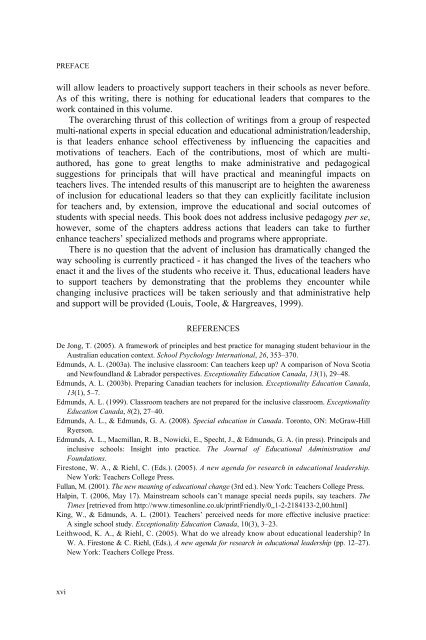Leadership for Inclusion
577-leadership-for-inclusion
577-leadership-for-inclusion
- No tags were found...
Create successful ePaper yourself
Turn your PDF publications into a flip-book with our unique Google optimized e-Paper software.
PREFACE<br />
will allow leaders to proactively support teachers in their schools as never be<strong>for</strong>e.<br />
As of this writing, there is nothing <strong>for</strong> educational leaders that compares to the<br />
work contained in this volume.<br />
The overarching thrust of this collection of writings from a group of respected<br />
multi-national experts in special education and educational administration/leadership,<br />
is that leaders enhance school effectiveness by influencing the capacities and<br />
motivations of teachers. Each of the contributions, most of which are multiauthored,<br />
has gone to great lengths to make administrative and pedagogical<br />
suggestions <strong>for</strong> principals that will have practical and meaningful impacts on<br />
teachers lives. The intended results of this manuscript are to heighten the awareness<br />
of inclusion <strong>for</strong> educational leaders so that they can explicitly facilitate inclusion<br />
<strong>for</strong> teachers and, by extension, improve the educational and social outcomes of<br />
students with special needs. This book does not address inclusive pedagogy per se,<br />
however, some of the chapters address actions that leaders can take to further<br />
enhance teachers’ specialized methods and programs where appropriate.<br />
There is no question that the advent of inclusion has dramatically changed the<br />
way schooling is currently practiced - it has changed the lives of the teachers who<br />
enact it and the lives of the students who receive it. Thus, educational leaders have<br />
to support teachers by demonstrating that the problems they encounter while<br />
changing inclusive practices will be taken seriously and that administrative help<br />
and support will be provided (Louis, Toole, & Hargreaves, 1999).<br />
REFERENCES<br />
De Jong, T. (2005). A framework of principles and best practice <strong>for</strong> managing student behaviour in the<br />
Australian education context. School Psychology International, 26, 353–370.<br />
Edmunds, A. L. (2003a). The inclusive classroom: Can teachers keep up? A comparison of Nova Scotia<br />
and Newfoundland & Labrador perspectives. Exceptionality Education Canada, 13(1), 29–48.<br />
Edmunds, A. L. (2003b). Preparing Canadian teachers <strong>for</strong> inclusion. Exceptionality Education Canada,<br />
13(1), 5–7.<br />
Edmunds, A. L. (1999). Classroom teachers are not prepared <strong>for</strong> the inclusive classroom. Exceptionality<br />
Education Canada, 8(2), 27–40.<br />
Edmunds, A. L., & Edmunds, G. A. (2008). Special education in Canada. Toronto, ON: McGraw-Hill<br />
Ryerson.<br />
Edmunds, A. L., Macmillan, R. B., Nowicki, E., Specht, J., & Edmunds, G. A. (in press). Principals and<br />
inclusive schools: Insight into practice. The Journal of Educational Administration and<br />
Foundations.<br />
Firestone, W. A., & Riehl, C. (Eds.). (2005). A new agenda <strong>for</strong> research in educational leadership.<br />
New York: Teachers College Press.<br />
Fullan, M. (2001). The new meaning of educational change (3rd ed.). New York: Teachers College Press.<br />
Halpin, T. (2006, May 17). Mainstream schools can’t manage special needs pupils, say teachers. The<br />
Times [retrieved from http://www.timesonline.co.uk/printFriendly/0,,1-2-2184133-2,00.html]<br />
King, W., & Edmunds, A. L. (2001). Teachers’ perceived needs <strong>for</strong> more effective inclusive practice:<br />
A single school study. Exceptionality Education Canada, 10(3), 3–23.<br />
Leithwood, K. A., & Riehl, C. (2005). What do we already know about educational leadership? In<br />
W. A. Firestone & C. Riehl, (Eds.), A new agenda <strong>for</strong> research in educational leadership (pp. 12–27).<br />
New York: Teachers College Press.<br />
xvi




